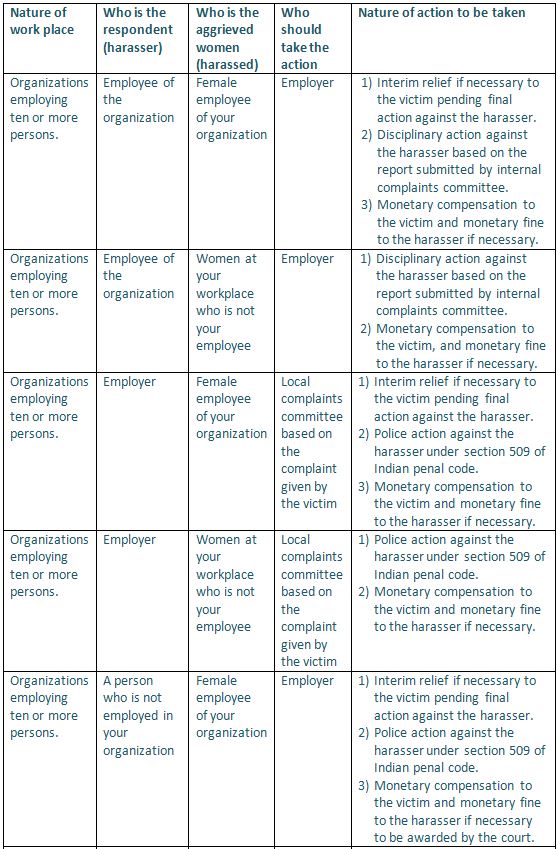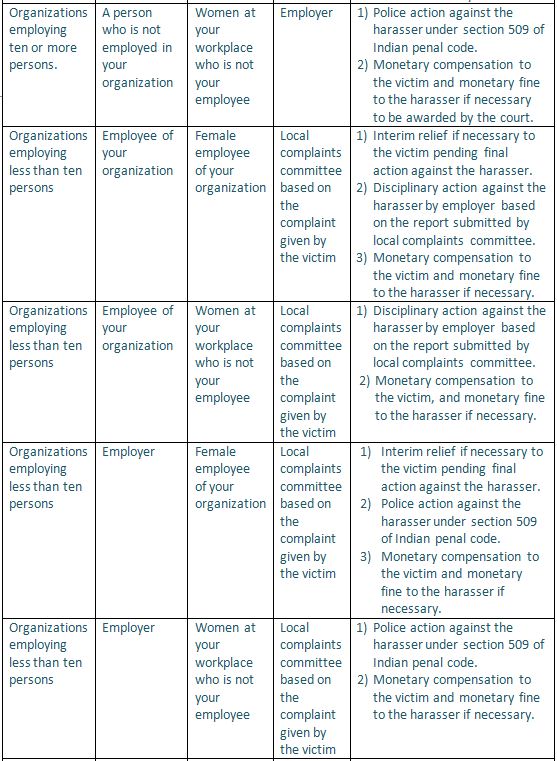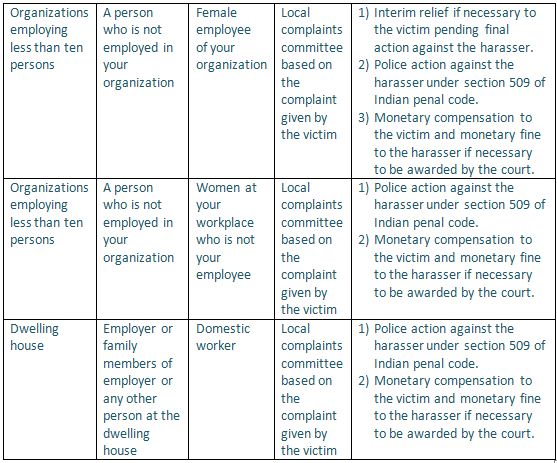|
Dr. G.P. Naik Principal Consultant, Talent Avenues, Bangalore Even though the concept of sexual harassment is as old as the history of mankind, its implication at the work place has received attention in recent times. In fact until the verdict in Vishaka Vs. State of Rajasthan (1997) case by the Supreme Court of India in 1997, there were no official guidelines to deal with the subject. The case relates to an alleged gang rape of a social worker in a village of Rajasthan. In this case the court opined that sexual harassment at work place amounts to violation of individual rights guaranteed under Article 14 (equality before law); 15 (prohibition of discrimination on the ground of sex,); 19 (right to practice freely any profession, trade or occupation); 42 (provision for humane conditions of work), and the citizens duties under Article 51A to renounce practices derogatory to the dignity of women. The Apex Court in this case has said that gender equality includes protection from sexual harassment and right to work with dignity which is a universally recognized human right. Equality of employment can be seriously impaired when women are subjected to gender specific violence such as sexual harassment at work place. Therefore the court had given detailed guidelines in the matter which became the law from 1997 to 2013, until Parliament enacted the Sexual Harassment of Women at Workplace (prevention, prohibition and redressal) Act 2013. Most of the guidelines given in Vishaka case are retained in the above Act. In Apparel Export Promotion Council Vs A.K.Chopra(1999) case, Supreme Court, has prevented the lower courts from reducing the punishment awarded by employer to the harasser and in Medha Kotwal Lele Vs Union of India(2012)verdict it clarified that the report of findings of sexual harassment prevention committee shall be treated as final by the employer to punish the guilty employee and domestic enquiry need not have to be conducted once again by issuing the charge sheet. OBJECTIVES OF THE NEW ACT This Act aims to protect women against sexual harassment at workplace by preventive measures like training, prohibitive measures like legal restriction, punitive measures like disciplinary action by employer or criminal action by police and rehabilitative measures like transfer and monetary compensation. The Act also provides protection to domestic workers (maid servants) against sexual harassment. It is immaterial whether the aggrieved woman is an employee or non employee or the harasser is an employee or non employee. It is also immaterial whether the harasser is a male or female. What is rather important to determine the applicability of this Act is whether the harassment occurred at workplace and whether the harassed person is a woman. APPLICABILITY The Act came into force with effect from 9th December 2013. This Act is applicable to all the workplaces including dwelling house. All the women at workplace irrespective of their age, salary, designation and nature of employment, are protected under this Act. Even non-employed women like consultants, service providers, customers and suppliers are protected by this Act. The perpetrators of harassment can be male or female employees or non employees like consultants, service providers, customers or suppliers. In view of the wider application of this Act, the harasser and harassed can be any one of the persons given in table No.1. The table also shows the authority responsible for initiating action against the harasser. IMPORTANT DEFINITIONS Aggrieved woman means a woman of any age who alleges to have been subjected to sexual harassment by the respondent. Appropriate government in respect of establishments owned, controlled or substantially financed by central government, is the central government. In other cases it is the state government. Employee includes a trainee, probationer, contract worker, apprentice, supervisor, and managerial employees. Respondent means a person against whom the aggrieved woman has made a complaint of sexual harassment. Sexual harassment includes physical contact and advances; or demand or request for sexual favours, or making sexually coloured remarks or showing pornography or any other unwelcome physical, verbal or non verbal conduct of sexual nature to a woman at workplace. If the act of sexual harassment is coupled with Implied or explicit promise of preferential treatment in her employment, or implied or explicit threat of detrimental treatment in her employment; or implied or explicit threat about her present or future employment status; or interference with her work or creating an intimidating or offensive or hostile work environment for her; or humiliating treatment likely to affect her health or safety, it will also amount to sexual harassment. Workplace includes factories, mines, plantations, shops, commercial establishments, hospitals, educational institutions, sports facilities, places where woman employee travels on duty, charitable organizations, and dwelling place or house. PREVENTION OF SEXUAL HARASSMENT
CONSTITUTION OF COMPLAINTS COMMITTEE
COMPLAINT PROCEDURE
CONCILIATION AND SETTLEMENT
INQUIRY INTO THE COMPLAINT
ACTION DURING THE PENDENCY OF ENQUIRY
ACTION AFTER THE COMPLETION OF ENQUIRY
APPEAL AGAINST THE ACTION TAKEN Any person aggrieved by the implementation of recommendation of the committee or by the non implementation of it, may prefer an appeal as per the service rules/ standing order, or as per the procedure prescribed by the government; within ninety days from the date of recommendation (section 18). ACTION AGAINST FALSE COMPLAINT AND FALSE EVIDENCE Section 14, of the Act deals with the action to be taken against the persons, who file false complaints or give false evidence in the enquiry. When the committee comes to the conclusion that any person has given false complaint, or produced false evidence in the enquiry, it may recommend to the employer or to the D.O., that action should be initiated as per standing order/ service rules against such person, or action as per the procedure prescribed by the government. CONFIDENTIALITY OF THE ACTION TO BE TAKEN The contents of proceedings under this Act and the action taken should not be revealed to public, press or any mass media. Whoever reveals such information shall be punished as per the service rules or as per the procedure prescribed by the government (Section 16 & 17). DUTIES OF THE EMPLOYER AND DISTRICT OFFICER
PENALTIES
DUTIES AND POWERS OF THE GOVERNMENT
TABLE NO.1. CONTEXT OF SEXUAL HARASSMENT AND NATURE OF ACTION REFERENCES
IMPORTANT INDIAN CASES OF HARASSMENT Coca Cola Case Coca Cola India has paid beauty queen Sushmita Sen Rs. 1.45 crores to buy her silence over an alleged sexual harassment case against its marketing head Mr. Sripad Nadakarni. The stunning charge was first made by Ms Sen, Coke’s erstwhile endorser, in a legal notice dated April 7, 2003 sent to the company by her solicitors, Bachubhai Munim. After a rough round of charges and counter charges, the MNC is believed to have silenced Ms. Sen by paying her on September 19, 2003. Ms. Sen’s accusation is now being investigated by former Supreme Court Chief justice S.P.Bharucha and further payments to the former miss Universe or to a charity of her choice as well as Mr. Nadkarni’s fate will depend on what justice Bharucha finds. When contracted Coca Cola did not touch upon the issue of sexual harassment. In a written response, it said: “This is a dispute between a corporate and its brand ambassador with respect to the celebrity engagement contract. The matter was discussed between the lawyers of both the sides. The same has been settled through a contract, mutually between the company and Sushmita Sen for an agreed consideration. Both parties are bound by the confidentiality clause of the said agreement. However the exchange of letters between Ms. Sen’s solicitors and Coke’s Lawyers, Udwadia and Udeshi- a copy of which is in Economic Times possession makes it explicit that the dispute between the two sides was, indeed, over the sexual harassment charge. Ms. Sen made it soon after Coca Cola terminated its celebrity engagement contract with her on February 23, 2003. She alleged this was being done because she had rejected the sexual overtures of a senior coke official. Her solicitors said in a seven page letter dated April 7, 2003 addressed to coke’s worldwide chairman Doug Daft and the then India head Alex Von Behr, the agreement has been terminated “to punish Ms. Sen who rightly resisted sexual harassment by one of your employees based in the Mumbai office of Coca Cola company. These solicitors then made a detailed case as to why the termination of the contract was illegal and added that Ms Sen would identify her tormentor only if Mr Von Behr and a senior Coke official from Atlanta met her in the next seven days. Obviously the issue was serious enough for Mr. Von Behr to go to Mumbai and meet Ms Sen at her residence in Mumbai on April 29, 2003, accompanied by the company’s legal director Rajiv Sarin. The details of this meeting is divergent, depending on whose version it is. Coke’s solicitors in their letter dated July 29, 2003 claim that Ms. Sen apart from divulging Mr. Nadkarni’s name was only interested in extorting monies, while not showing any interest in Mr. Von Behr’s offer of an internal inquiry into the matter. They further denied all charges and said Coke owed her nothing including Rs.50 lakh and Rs. 4785 of unpaid dues, and made a counter claim on Ms. Sen to pay Rs.1.45 crores for making false allegations. In response, Ms. Sen’s solicitors sent another letter dated 12-8-2003 which is after the pesticides controversy broke on August 5, 2003 repudiating coke’s version of the meeting. They said that Ms. Sen offered to give all details of the alleged sexual harassment before an independent inquiry committee. But Mr. Von Behr had offered to set up an all female committee of Coke employees which did not inspire trust in Ms. Sen. As for Cokes charges about Ms Sen’s extortionist behaviour, the letter said. These allegations and the threat of civil and criminal action for alleged defamation are nothing but a show of might by an MNC in order to scare and muzzle our client says the solicitors of Ms.Sen. The sum of Rs. 1.45 crores has since been paid by the Coca Cola company to Ms. Sushmita Sen wide cheque No 932968 dated 19-09-2003 of ABN Amro Bank. (Source: Economic Times dated 08-12-2003, Outlook magazine dated 22nd December 2003, and Indian Expresses dated 11th December 2003 ). Infosys CaseThe sordid 18 month old drama involving IT bellwether Infosys Technologies and its two former employees over a sexual harassment case came to an end on Sunday. Infosys reached a three million dollar out of court settlement with former employee Reka Maximovitch, who had filed a law suit against the company and its former director Phaneesh Murthy, alleging wrongful termination and sexual harassment. Under the terms of settlement, Infosys will contribute 1.5 million dollars and the balance 1.5 million will be contributed by insurers under the company directors and officers liability insurance cover. There is no contribution from Phaneesh Murthy, former director of the company and head of worldwide sales and marketing towards this settlement. The settlement was reached on April 25 2003 and the company has 35 days to make the payment. Subsequently the plaintiff would withdraw the law suit within three days of receiving the payment. Infosys keeps its option to proceed against Mr. Phaneesh Murthy. Narayana Murthy the Chairman of Infosys made his displeasure known on the way Phaneesh Murthy operated very clearly and came down heavily on him. Narayana Murthy said Phaneesh had failed to disclose some important facts including the fact that he had a relationship with Reka Maximovitch. He further said that it is unknown to the company that she had filed a charge of discrimination against Mr. Phaneesh and the company and she had previously filed with the court a request to issue a restraining order against Phaneesh murthy. Narayan Murthy also said this was inconsistent with the duties of Phaneesh as an officer and a director of the company. This has increased the company’s risk. The allegations were serious and the demanded compensation was in excess of several multiples of what we finally paid, Narayana Murthy said citing the reason behind the company’s decision to go for an out of court settlement. Besides, the distraction caused to the management was significant and the law suit was draining management time and attention. The company also spent $900000/- as legal fees to deal with this case. (Source Indian Express dated 12-05-2003). Infosys Technologies Ltd, was again faced with a sex lawsuit involving its former director Phaneesh Murthy. Jennifer Griffith, who was employed with Infosys in the US when Phaneesh was still with the company, filed the case on 30th September 2003. In a terse statement to the media, Infosys disclosed the lawsuit had been filed in the Superior Court of California, Alameda County, alleging that Phaneesh sexually harassed Griffith while she was working with him in the company's US office. Phaneesh Murthy totally denied allegations and said he will fight out the case in the court of law. On 24 November 2004, Infosys Technologies Ltd has disclosed to Mumbai stock Exchange that Phaneesh Murthy has entered into a out of court of settlement with Jennifer Griffith for US$800000/- half of which was paid by the Mr. Murthy and remaining half by the Insurance Companies for Infosys Technologies Ltd.(News paper reports dated 24 Nov.2004). iGate Case Phanessh Murthy was later employed as CEO of iGate Solutions Limited. The iGate's board of directors on 20th May 2013, terminated the services of Phaneesh Murthy due to the facts and circumstances surrounding Murthy's relationship with a subordinate employee and a claim of sexual harassment. The investigation has reached the finding that Murthy's failure to report this relationship violated iGate's policy, as well as Murthy's employment contract. Phaneesh Murthy will be sued for sexually harassing the firm's investor relations head and allegedly making her pregnant, the law firm representing the victim said on 23rd May 2013. The California-based law firm, Aiman-Smith & Marcy, said that iGate's head of investor relations Araceli Roiz was pregnant with Murthy's child. Murthy told the iGate board of his relationship with Roiz only after she informed him that she will be taking legal action against him, Roiz's legal firm Aiman-Smith & Marcy said in a statement. The law firm, which had represented Reka Maximovitch and Jennifer Griffith in the previous sex harassment lawsuits against Murthy, said Roiz remains an employee of iGate and is on medical leave at present."When he discovered this (that Roiz was pregnant), Murthy pressured Ms Roiz to have an abortion. When she refused, he told her to leave the company, quietly, to protect his position as CEO," it said in the statement. Murthy, who had after his sacking stated that he was in relationship with Roiz for "few months" and the sexual harassment case against him was an extortion attempt, could not be immediately reached for comments. The law firm claimed Murthy began pursuing Roiz shortly after she joined iGate in May 2010 and insinuated himself into her personal life using the pretext of business necessity. "On behalf of Roiz, we are contemplating next steps, which will certainly include court action against Murthy and iGate," it said adding the Fremont, California-based company was liable for the conduct of its CEO. While sacking Murthy, iGate had said that an outside probe, which is continuing, had not found any violation of the company's harassment policy. "We do not believe a full, impartial, investigation can possibly result in this conclusion, but we note that, according to iGate, its investigation is continuing. We hope that iGate will take appropriate responsibility in this matter and that it can be concluded on that basis," the law firm said. On Murthy's claims that Roiz was engaging in "extortion" by bringing this case against him, the law firm said "Murthy's comments are defamatory and a despicable attempt to 'blame the victim', who only wants to somehow continue her career and support her child." Pomerantz Grossman Hufford Dahlstrom & Gross, a New York-based law firm, on 16th June 2013, has filed a class action lawsuit against iGATE and some of its officials alleging violations of federal securities’ laws. It seeks compensation for iGATE shareholders who were not informed about former Chief Executive Officer Murthy’s relationship with one of the company’s employees, according to lawyers tracking the development. The class action suit has been filed in United States District Court, Northern District of California, on behalf of all those who purchased iGATE shares between March 14, 2012 and May 21, 2013. The law firm alleges that iGATE and its officials made ‘materially false and misleading statements’ regarding its ‘business, operational and compliance policies’ between March 14, 2012 and May 21, 2013, when Murthy was at the helm of affairs. IIMB punishes the victim and protects the guilty Indian Institute of Management, Bangalore (IIM-B),one of the prestigious B-schools of the country, is facing a severe reputation crisis with the chief administrative officer (CAO) accused of sexual harassment by a lady medical officer, who has been relieved from the institute earlier this year even before the probe is complete. The lady medical officer (name withheld) has alleged that the CAO had been harassing her since 2009. Fed up with his alleged behavior, she lodged a complaint against him with the IIMB's Gender Sensitive Committee (GSC) in 2011. However, even before the probe into the matter could be completed, the complainant was shown the door in January 2012. Though it is more than a year since the complaint has been lodged, several applications filed under the RTI Act by social activists seeking report of the probe against the CAO are being rejected by the IIM-B contending that inquiry is still on. The lady doctor's troubles started when her appointment as the institute's medical officer was regularized in 2009. She was put on probation for two years and was directed to report to Vassist. “The sexual advances by the CAO started a few weeks after I joined, and was brought to the notice of IIMB director Prof Pankaj Chandra in the presence of Prof Mahadevan the then dean of administration. The director apologized and I was asked not to take serious notice of the CAO’s comments. But I continued to suffer insults and humiliation at the hands of the CAO for spurning his sexual advances. The situation kept getting worse and reached a state where I could take no more,” she alleged. “When Vassist came to know that I had taken up the matter with the director, he told me that it had angered him no end and he was not going to forgive me. For him, it was like seeking revenge, whether it was intimidating me at my workplace, fiddling with my personal files, or asking his associates to lodge false complaints against me. He tried everything under the sun to manipulate the circumstances so that I would put in my papers and leave,” she alleged. According to her, a situation was created by Vasist to ensure that the medical officer (herself) move into the campus as their resident doctor, which was not a requirement in her contract. “I had to succumb to the pressure and requested accommodation after my son’s final exams were over- which was soon forgotten, clearly reflecting that the whole exercise was done to harass me so that I would quit the job in frustration. On November 8, 2010, I verbally reported sexual and workplace harassment by the CAO to the chairperson of the gender sensitivity committee of IIMB. At that time, my requests were not taken seriously enough to take any action against the CAO and a change in the reporting structure was requested. On December 15, I verbally reported the matter again to the director and the newly appointed dean of administration, Prof Raghunath,” she said. The victim was placed under the dean of administration as her reporting officer in March 2011. Even then, she complained of continued harassment and also requested campus accommodation. “The dean of administration tried to convince me to leave the campus and start my own private practice, which I refused to do as they themselves had urged me to leave Apollo Hospitals and join IIMB. I also informed him that I would be submitting a written complaint shortly since the CAO was continuing to create a hostile working environment for me, upon which I was greeted with mockery and was told that I would be ‘required to do demeaning things’. On getting nowhere with the verbal complaints, I filed a written complaint with the GSC in July 2011,” she said.“On January 30, 2012, I was given two letters by the personnel section, one stating that my services at IIMB had been terminated with effect from January 31 and the second stating that I was exempted from attending to my duties the same day. Around 5.30 in the evening, some persons were sent to literally throw me out of the campus and I also got to know that the director had personally instructed the computer manager of IIMB to disable my account at 5 pm. All this was done with no prior information given or any explanations provided,” she alleged. The lady doctor filed a case in the High Court against the termination of her services, which she lost. The lady doctor, in her complaint to the IIMB GSC, has detailed the case, which spreads over three years. She was working on a temporary basis as the medical officer of the IIMB, which regularized her services in 2009. She was placed on probation for two years under the CAO. She alleged that soon the CAO started making sexual advances towards her. When she brought the incident to the notice of the IIMB management, it allegedly angered the CAO, who apparently intensified the harassment. On November 8, 2010, she verbally reported sexual harassment at workplace to the GSC. She once again raised the matter with the IIMB management on December 15, 2010. Subsequently, the IIMB changed her reporting structure and placed her under the Dean of Administration, in March 2011. However, she alleged that a hostile environment was created making it difficult for her to work at the IIMB. Some of the senior staff reportedly even asked her to leave IIMB and start her own practice after it became evident that she would lodge a written complaint against the CAO with the GSC. "Eventually, as there was no progress, I lodged a written complaint with the GSC in July 2011. I was told that the matter is under investigation. But on January 30, 2012, I received a letter stating that my services had been terminated from the very next day (January 31). I had no option other than quitting the institute," she alleged. Though she approached the High Court of Karnataka questioning her termination from the IIMB, she lost the case. In-house panel pinpoints chief administrative officer’s alleged remark that ‘lady doctors in white coats turn me on’. Meanwhile, the officer has approached the HC for quashing of the inquiry report and revocation of his suspension. The in-house investigation into a sexual harassment case at IIMB has taken an interesting turn with the institute’s gender sensitivity committee (GSC) , set up to probe a complaint by a lady medical officer against chief administrative officer C V Indu Shekar Vassist, establishing that the latter had “subjected her to sexual harassment and had created a hostile and offensive environment for her at the workplace.” The GSC report, a copy of which has been accessed by Bangalore Mirror, has recommended that Vasist be dismissed from service on the grounds that his actions are “subversive of good discipline and not conducive to proper working in the institute, where there are a number of female students and employees.” The GSC has also taken exception to Vassist’s alleged sexist remark to the effect that “lady doctors in white coats turn me on.” The report had been kept confidential, despite the panel submitting it to the IIMB head honcho five months ago, even as Vassist was placed under suspension. Vassist has gone to the High Court challenging the suspension order effected on the basis of the GSC report and the subsequent findings of an adhoc committee that had been set up to review the GSC’s findings. He has pleaded with the court to quash the two reports and revoke his suspension. The court on 21st January 2013 refused to give any relief to Mr.Vashist. Indicting Vassist, the 26-page GSC report states: “The institute has many women students and employees, and it is important that the environment should be free from any such pressures and sexual harassment at the workplace so that women can study or work without any tension or stress. The actions of Vasist were unbecoming of the good conduct and behaviour expected from a superior officer.” An ad hoc committee headed by a retired judge to review the GSC report agreed with the panel’s conclusions, while recommending that the punishment (dismissal from service) be reduced. Meanwhile, the doctor, whose services were terminated in January 2012, has claimed that she has been receiving threatening calls after Vassist received his suspension order. “The day after Vimochana staged a protest outside IIMB, I received a call and the caller he was Indu Shekhar (Vassist) and that I have brought a bad name to the institution and defamed him, (and) I will not be alive. “On December 8, 2012 and again on December 12, 2012 I received calls saying that they will finish me off. I have lodged an FIR with the police on December 17, 2012 in regards to these calls,” she said (Source: India Today 26th Nov 2o12, Bangalore Mirror, 20th Nov 2012 and 3rd Jan 2013). One year after IIM Bangalore faced the embarrassment of sexual harassment charges being made against their Chief Administrative Officer, the management sacked CAO Indu Shekar Vassist on 29th May 2013. Sex charge forces India-born Penguin chief to quit 14th June 2010, Toronto. Days after announcing that he was voluntarily quitting Penguin International as its chief executive officer, India-born David Davidar has now said the company terminated his services in the wake of a sexual harassment suit slapped against him by a former woman colleague, who is demanding $523,000 in damages. "Earlier this week it was announced that I would be leaving Penguin Canada. At Penguin's request, I agreed to publicly state that my departure was voluntary. The truth is that a former colleague accused me of sexual harassment and Penguin terminated my employment," Davidar, 52, one of the most influential Indians in the international publishing industry, said. His statement came as Lisa Rundle, former rights and contracts director of Penguin Canada, filed a sexual harassment suit against him. Rundle filed the $523,000 suit by way of statement of claim on Thursday in an Ontario superior court of justice, alleging that Davidar, who was also president of Penguin Canada, sexually harassed her repeatedly over the past three years, culminating in outright assault at the Frankfurt Book Fair last fall, and that she was fired after complaining to superiors about his "twisted treatment" of her, the Globe and Mail reported. Rundle of Toronto, who used to look after digital publishing and foreign rights for Penguin Canada, is claiming damages of $423,000 from Penguin for "wrongful" dismissal and the "harsh, vindictive and malicious fashion" in which it allegedly treated her following her complaints against Davidar. She is also seeking damages of $100,000 from Davidar personally. According to a statement released by Penguin Canada: "Ms Rundle also made a number of claims relating to Penguin Canada including wrongful termination." However, Penguin Canada contends that she was "not terminated" by the company; rather, she informed the company of her decision to leave "after having declined to pursue other career opportunities within the organisation." In a statement emailed to the media, Davidar said he is "utterly shocked by the allegations" that he sexually harassed a former colleague. He said he intends to fight the suit in court and that he is "certain that the truth will prevail." "I had a friendship with my colleague which lasted for three years," said Davidar, hitherto the 'golden boy' of the publishing industry. He also said he was "dismayed that Penguin Canada chose to respond to them [the allegations against him] by directing me to leave Penguin." When he stepped down from Penguin Canada earlier this week and from his job as CEO of Penguin International, a position he had only held since January, he said it was to return to writing. "Principally, I wanted to [return to] my writing. I've got about six chapters of a new novel done," he told Quill & Quire. "I wrote my previous two novels while I was working, and I wanted to see if I could give this one [a better] shot if I didn't have a day job to go to. So my plan is to take at least a year to see if I can finish the novel," he had said. Davidar, who came to Canada from Penguin India in 2003, said he does intend to pursue his writing career, and that he does not intend to make further comments on the pending lawsuit. His last day in office was to be August 15. Penguin Canada said the firm "expect to appoint a new head of the Canadian company in the near future." The accusations against Davidar were accompanied by quotations from several email messages he allegedly sent to Rundle during the period in question. Last year, he is said to have written that he "could do very little except think of [Rundle]," that she was "utterly gorgeous", "a vision in pink sipping a champagne cocktail", and that she should not be "stubborn" or "fight" him, the paper reported. At the Frankfurt Book Fair last October, according to the claim, Davidar appeared at Rundle's hotel room door "wearing excessive cologne, with buttons on his shirt undone down [to] his waist." Rundle claimed she climbed on a windowsill to avoid her boss and asked him to leave. "He forcibly pulled her off the ledge and grabbed her by the wrists, forcing his tongue into her mouth," the report said.
0 Comments
Leave a Reply. |
Categories
All
Prevention of Sexual Harassment at Workplace (PoSH)50,000 HR PROFESSIONALS ARE CONNECTED THROUGH OUR NIRATHANKA HR GROUPS.
YOU CAN ALSO JOIN AND PARTICIPATE IN OUR GROUP DISCUSSIONS. |













 RSS Feed
RSS Feed




